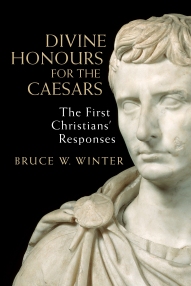 Welcome to Friday Book Corner.
Welcome to Friday Book Corner.
Right now the topic of early Christianity and conflict with the empire is hot. Everybody and their brother wants to weigh in. Unfortunately, some are not as well informed as they should be.
Thankfully there are people like Bruce Winter, a recognized historian who knows the ancient literature up and down and all around. Winter has written a very useful book, Divine Honours for the Caesars: The First Christians’ Responses (Eerdmans, 2015).
About half the book is devoted to little essays on the Greco-Roman world and the call for divine honours and how various groups related to the emperors. The second half of the book dips into a variety of case studies, as it were, that shed light on how the early Christians responded to expectations of divine honours. Let me say one thing right off the bat -the first half of the book is outstanding and should become required reading in courses on Greco-Roman context of the NT (I will say why in a moment). On the other hand, the second half is more disjointed and makes plausible cases, but is not as weighty in my opinion.
Part I: Divine Honours for the Caesars and the Roman East
Here is what I think is particularly useful about this book. First, Winter focuses, not on worship of the emperors, but “divine honours.” I think he is absolutely spot on with this (and Holland Hendrix long ago made a similar case), because the focus is on absolute loyalty and imperial supremacy, not on “ontology” per se. Second, Winter is in the habit of quoting primary sources a lot, and this demonstrates he has done his homework, and it is extremely helpful for the reader to make up his or her own mind about whether Winter has interpreted the evidence correctly (I do disagree with arguments and interpretations once or twice). I was especially impressed with Winter’s discussion of divine titles, particularly the difference between deus and divus, and the study of “son of god” vs. “the son of god” in Greek texts (63-74).
Part II: Divine Imperial Honours and the First Christians’ Responses
As for the second half, while Winter does make some impressive observations (could it be that so-called “gods…on earth” are the emperors in 1 Cor 8:5?), he does not make lengthy, airtight cases. These are soundings, as it were. No doubt they will start important conversations, and spark further research, but the second half is marked less by mastery of the material than the first half. I do not fault Winter for this, but it does leave the book less satisfying than I expected.
Perhaps the biggest disappointment for me is that Winter does not engage with the major NT scholarship in the “Paul and Empire” discussion. He does not interact at all with N.T. Wright or John Barclay (on this subject). Nor does he include the important contributions of Peter Oakes and Warren Carter. What Winter offers is, undoubtedly, very helpful to the wider discussion, but Winter never really critiques the discussion directly. I can only speculate as to why, but my guess is that he prefers to focus on the work of historians, not theologians. So, he does engage with Harrison and Horsley a bit, but not with a broader interest in the debate.
My last criticism – the book has no conclusion-chapter. I am not sure why someone would make this omission. Surely a conclusion of a few pages would be pretty easy to do, and help bring together and summarize his arguments and insights.
Conclusion
Obviously I think the contributions of this book outweigh any of the drawbacks I have mentioned. Winter is very knowledgable regarding the ancient world, he is engaged in the conversations among classicists, and he places the focus on “divine honours” as most central (rather than religious “worship”). Well worth reading, and I will return to this work often.











